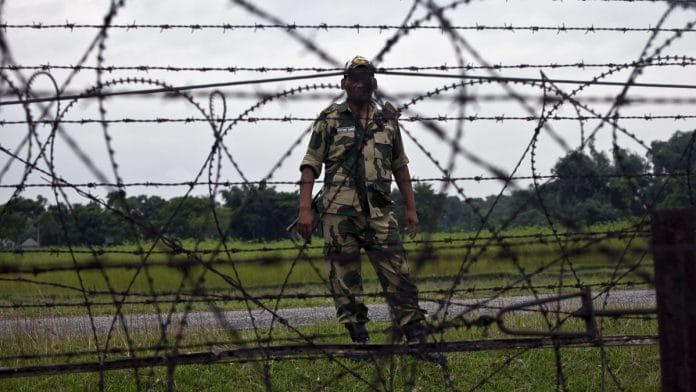
The talks are taking place in the background of Bangladesh’s Home Adviser Lt Gen (retd.) Md Jahangir Alam Chowdhury’s statement about “uneven” border agreements with India. He said that Dhaka will address scraping them at the DG-level talk. The statement was followed by a display of aggression by the BGB toward BSF, which is constructing fences in small patches of land located within 150 yards of the International Border (IB). The BGB says the construction violates the 1975 Joint India-Bangladesh guidelines for Border Authorities.
These guidelines were agreed upon to ensure that the two border guarding forces coordinate with each other in order to control border crime and maintain peace.
Neighbours and fencing
One of the provisions of the guidelines is that no defence structure can be constructed within 150 yards on both sides of the IB. While Bangladesh and Pakistan see fencing as a defence structure, India does not. It has generally constructed fences at or beyond 150 yards from the IB to maintain peace and avoid disrupting border life. However, in challenging terrains or populated areas, fencing within 150 yards becomes inevitable. In such cases, BGB authorities are consulted and construction happens only after a joint survey and mutual consent.
The fence construction work within 150 yards at five specific locations, now objected to by the BGB, was initiated only after following protocol. Bangladesh lodged protest by summoning the Indian High Commissioner.
Keeping in view the hardened stance of Bangladesh, India too prevented construction activity by the Bangladeshis within 150 yards of the IB.
Maintaining peace along the 4,096 kilometres of the India-Bangladesh border is of utmost importance because the residents of both countries cultivate their fields right up to the IB. Villages located along the IB on the far side of the fence are vulnerable to threats from criminals. Any increase in tension on the borders will be detrimental to their interests.
Therefore, the Bangladesh Home Adviser’s statement and BGB’s aggression toward BSF is problematic. The upcoming DG-level talks must focus on de-escalating the situation and ensuring proper coordination between the two border guarding forces in their efforts to control trans-border crimes.
Coordinated border management
In the last couple of decades, one of the contributing factors to good relations between India and Bangladesh is the coordination between the two border guarding forces. The Director Generals of both sides signed the Coordinated Border Management Plan (CBMP) in 2011. It provided for periodic review of crime-prone areas to adjust the deployment of troops and coordinated patrolling by both forces.
The CBMP also provided for enhanced interaction between commanders at various levels so that local problems can be addressed in a quick time frame. Liaison officers were designated at Frontier and Sector levels to discuss and resolve tricky situations, which if not addressed quickly could lead to major problems.
The mechanism provided in the CBMP has worked well so far for the mutual benefit of the population on both sides. I retrieved a busload of civilians within a couple of hours by talking to my Bangladeshi counterpart on the phone. The driver, unfamiliar with the area, crossed over into Bangladesh through an open Customs gate by mistake. It is only an excellent level of cooperation between the two forces that saved the day—avoiding weeks-long delays.
The type and nature of borders play an important role in determining the level of relations between two neighbouring countries. The friendly borders become bridges leading to enhanced cooperation and the borders which with issues become barriers leading to tension and difficulties for border residents. The pronouncements made by Chowdhury have the potential to disturb the equilibrium and cause innumerable problems for border residents.
Geography, culture, language, and familial ties create interdependence between India and Bangladesh, making good relations essential. It is, therefore, important that the upcoming talks take place in a conducive environment for mutual benefit.
The spirit behind the CBMPs must be maintained to ensure cooperation between the BGB and BSF for the benefit of residents of the border area.
Sanjiv Krishan Sood is the BSF Additional Director General (Retd). He tweets @sood_2. Views are personal.
source : theprint
